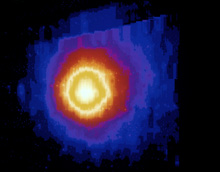http://www.youtube.com/watch?
- LRK -
-----
Bob_Richards
RT @NASA_Ames: [News] @LCROSS_NASA team Press Conference http://bit.ly/6QW8wR
[splashdown results, intro by Pete @Worden]
-----
The LCROSS Press Conference on YouTube is an hour and 20 minutes with the first 31 minutes the presentation the rest devoted to questions and answers.
I found it interesting and you could sense the excitement of the presenters.
Watching it brought back fond memories of sitting in the same auditorium when I was working at NASA Ames Research Center.
A Facebook link about LCROSS
- LRK -
http://www.facebook.com/
Links on "LCROSS Lunar Impactor Mission"
http://www.nasa.gov/mission_
LCROSS Impact Data Indicates Water on Moon
It will be interesting to see what develops as a result of spacecraft orbiting the Moon and finding more about our nearest neighbor.
We will wait for the results from the LRO mission and how their data complements what is being seen from LCROSS.
http://lunar.gsfc.nasa.gov/
http://www.examiner.com/x-958-
http://article.wn.com/view/
http://www.thaindian.com/
Exciting times and next year should be interesting too.
I hope the excitement finds its way into the ears of our Congress as well.
http://www.nasa.gov/pdf/
NASA FY 2010 Budget Request Summary
Mother may I have a cookie? Have you eaten all of your dinner?
Now where was the cookie jar hidden?
Thanks for looking up with me.
Larry Kellogg
Web Site: http://lkellogg.vttoth.com/
BlogSpot: http://kelloggserialreports.
RSS link: http://kelloggserialreports.
Newsletter: https://news.altair.com/
Twitter: http://twitter.com/lrkellogg
Facebook: http://www.facebook.com/
Google Wave: larry.kellogg@googlewave.com
Google Wave Invite info:
http://www.googlewaveinvite.
https://wave.google.com/wave/
==============================================================
http://www.planetary.org/news/2009/1113_LCROSS_Lunar_Impactor_Mission_Yes_We.html
Planetary News: The Moon (2009)
LCROSS Lunar Impactor Mission: "Yes, We Found Water!"
By Emily Stewart Lakdawalla
November 13, 2009
Members of the LCROSS science team were evidently delighted to be able to report at last that when the spacecraft's spent Centaur upper stage smashed into the Moon on October 9, it excavated a crater into a spot on the lunar surface that contained "a significant amount" of water, the mission's principal investigator, Tony Colaprete, said in a press briefing today. The ejecta plume from the impact contained at least 100 kilograms of water. But the same data that conclusively identifies water also indicates that the plume contained a surprisingly complex cocktail of other elements and compounds that the team is now struggling to identify.
snip
==============================================================
http://www.nasa.gov/home/hqnews/2009/dec/HQ_09-282_SLI.html
NASA CHALLENGES 350 ROCKETEERS NATIONWIDE TO AIM A MILE HIGH
HUNTSVILLE, Ala. -- NASA has invited more than 350 student rocketeers from middle schools, high schools, colleges and universities -- 37 teams nationwide -- to take part in the 2009-2010 NASA Student Launch Projects. Their challenge is to build powerful rockets of their own design, complete with a working science payload, and launch them to an altitude of 1 mile.
These annual rocketeering projects are the Student Launch Initiative for middle school and high school teams and the University Student Launch Initiative for colleges and universities. Both challenges are designed to inspire students to parlay their interests in science, technology, engineering and mathematics into rewarding careers in fields critical to NASA's mission of exploration and scientific discovery.
snip
==============================================================
http://www.nasa.gov/home/hqnews/2009/dec/HQ_09-278_Moon_work.html
MOON WORK DESIGN CONTEST OFFERS NASA INTERNSHIPS TO WINNERS
WASHINGTON -- Talented engineering students who have ideas on how future explorers might live on the moon could find themselves working at NASA as paid interns.
The 2010 NASA Moon Work engineering design challenge seeks to motivate college students by giving them first-hand experience with the process of developing new technologies. To participate in the contest, students will submit their original design for tools or instruments that can help astronauts live and work on the moon.
Top-ranked students will be offered a chance to intern with a team from NASA's Exploration Technology Development Program.
The Exploration Technology Development Program develops new technologies that will enable NASA to conduct future human exploration missions while reducing mission risk and cost. The program is maturing near-term technologies to help enable the first flight of the Orion crew exploration vehicle and developing long-lead technologies needed for possible lunar exploration missions.
snip
==============================================================
http://www.nasa.gov/home/hqnews/2009/nov/HQ_09-277_glove_challenge.html
NASA AWARDS $350,000 TO WINNING ASTRONAUT GLOVE DESIGNERS
WASHINGTON -- NASA's Centennial Challenges program awarded $350,000 this week to a pair of designers who developed concepts for more flexible space gloves that could make it easier for astronauts to perform tasks.
The 2009 Astronaut Glove Challenge awarded a first place prize of $250,000 to Peter Homer of Southwest Harbor, Maine, and a second place prize of $100,000 to Ted Southern of Brooklyn, N.Y. The competition seeks innovative spacesuit glove design concepts to reduce the effort needed to do work during spacewalks. In this challenge, competitors demonstrated their glove design by performing a range of tasks with the glove in a pressurized chamber.
snip
==============================================================
WHAT THE MIND CAN CONCEIVE, AND BELIEVE, IT WILL ACHIEVE - LRK
==============================================================
Planetary News: The Moon (2009)
LCROSS Lunar Impactor Mission: "Yes, We Found Water!"
By Emily Stewart Lakdawalla
November 13, 2009
Members of the LCROSS science team were evidently delighted to be able to report at last that when the spacecraft's spent Centaur upper stage smashed into the Moon on October 9, it excavated a crater into a spot on the lunar surface that contained "a significant amount" of water, the mission's principal investigator, Tony Colaprete, said in a press briefing today. The ejecta plume from the impact contained at least 100 kilograms of water. But the same data that conclusively identifies water also indicates that the plume contained a surprisingly complex cocktail of other elements and compounds that the team is now struggling to identify.
snip
==============================
http://www.nasa.gov/home/
NASA CHALLENGES 350 ROCKETEERS NATIONWIDE TO AIM A MILE HIGH
HUNTSVILLE, Ala. -- NASA has invited more than 350 student rocketeers from middle schools, high schools, colleges and universities -- 37 teams nationwide -- to take part in the 2009-2010 NASA Student Launch Projects. Their challenge is to build powerful rockets of their own design, complete with a working science payload, and launch them to an altitude of 1 mile.
These annual rocketeering projects are the Student Launch Initiative for middle school and high school teams and the University Student Launch Initiative for colleges and universities. Both challenges are designed to inspire students to parlay their interests in science, technology, engineering and mathematics into rewarding careers in fields critical to NASA's mission of exploration and scientific discovery.
snip
==============================
http://www.nasa.gov/home/
MOON WORK DESIGN CONTEST OFFERS NASA INTERNSHIPS TO WINNERS
WASHINGTON -- Talented engineering students who have ideas on how future explorers might live on the moon could find themselves working at NASA as paid interns.
The 2010 NASA Moon Work engineering design challenge seeks to motivate college students by giving them first-hand experience with the process of developing new technologies. To participate in the contest, students will submit their original design for tools or instruments that can help astronauts live and work on the moon.
Top-ranked students will be offered a chance to intern with a team from NASA's Exploration Technology Development Program.
The Exploration Technology Development Program develops new technologies that will enable NASA to conduct future human exploration missions while reducing mission risk and cost. The program is maturing near-term technologies to help enable the first flight of the Orion crew exploration vehicle and developing long-lead technologies needed for possible lunar exploration missions.
snip
==============================
http://www.nasa.gov/home/
NASA AWARDS $350,000 TO WINNING ASTRONAUT GLOVE DESIGNERS
WASHINGTON -- NASA's Centennial Challenges program awarded $350,000 this week to a pair of designers who developed concepts for more flexible space gloves that could make it easier for astronauts to perform tasks.
The 2009 Astronaut Glove Challenge awarded a first place prize of $250,000 to Peter Homer of Southwest Harbor, Maine, and a second place prize of $100,000 to Ted Southern of Brooklyn, N.Y. The competition seeks innovative spacesuit glove design concepts to reduce the effort needed to do work during spacewalks. In this challenge, competitors demonstrated their glove design by performing a range of tasks with the glove in a pressurized chamber.
snip
==============================
WHAT THE MIND CAN CONCEIVE, AND BELIEVE, IT WILL ACHIEVE - LRK
==============================





No comments:
Post a Comment
Note: Only a member of this blog may post a comment.